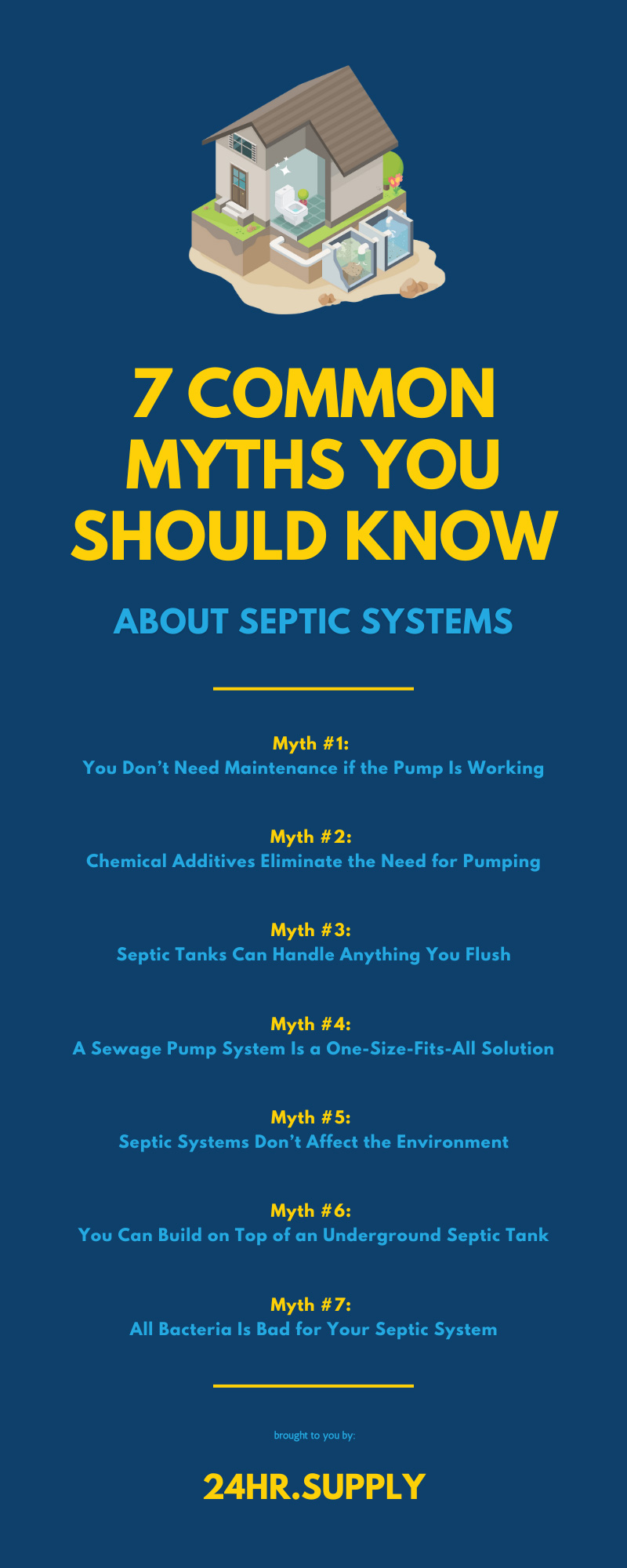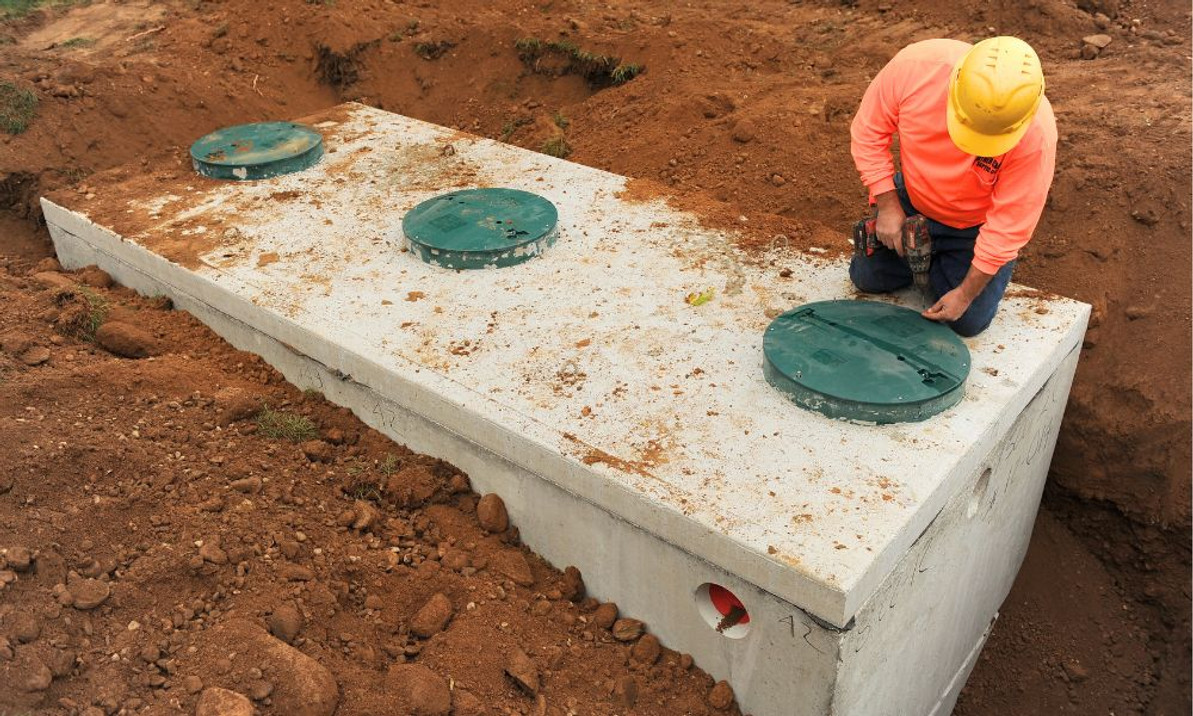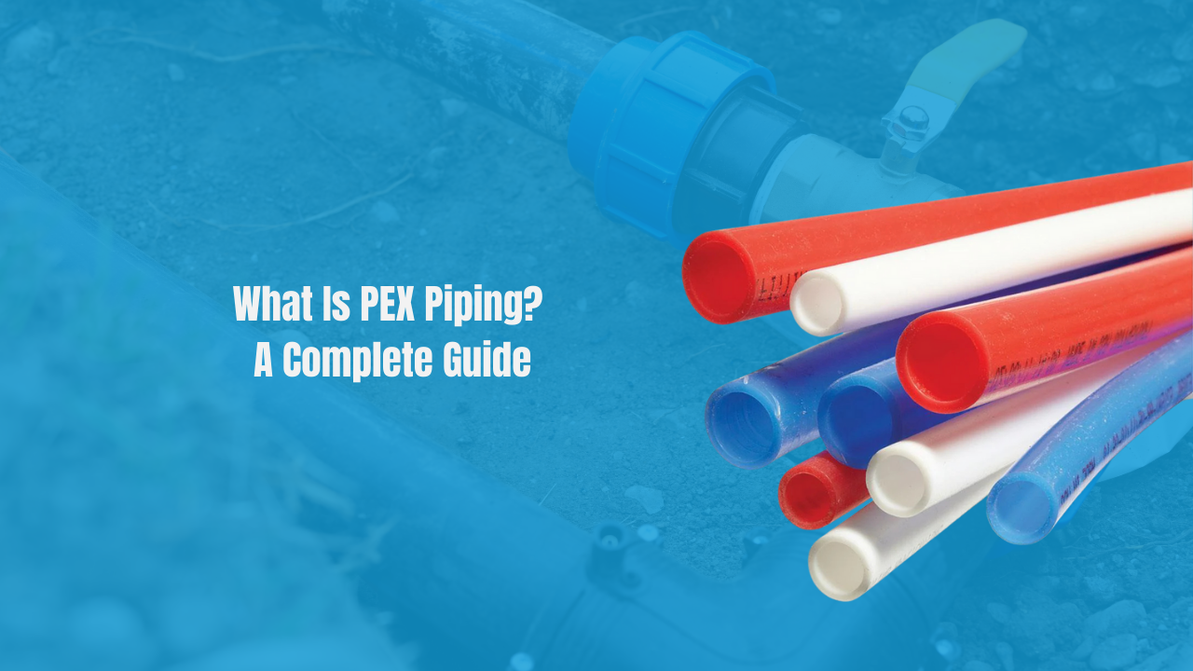7 Common Myths You Should Know About Septic Systems
Whether you’re maintaining your own home’s septic system or working on a client’s sewage tank, don’t fall for some of these common septic system misconceptions. You should know that regular maintenance and scheduled pumpings are crucial to the proper functioning of your septic tank.
Have you heard any of the following septic tank myths before? 24hr Supply aims to debunk them one by one and provide more reliable information about how septic systems really work.
Myth #1: You Don’t Need Maintenance if the Pump Is Working
If your septic system has been functioning properly for a long time, it’s easy to let regular maintenance fall by the wayside. Why would you clean or maintain your sewage pump if it’s not causing you any problems?
Despite what you may have heard, regular maintenance and scheduled pumpings are crucial to the long-term functionality of your septic system. Neglecting this maintenance can result in unpleasant buildup and a potential backup of the system. Avoid costly repairs or even a complete system replacement by inspecting your septic tank at least once a year. Depending on the size and usage of the system, you’ll need to pump it out every three to five years.
Myth #2: Chemical Additives Eliminate the Need for Pumping
While chemical solutions can unclog septic backup in the short term, be careful of what you pour down the toilet or into the tank. Inorganic compounds like strong acids and bases will quickly tackle a nasty clog; however, they can also corrode the tank and kill the helpful bacteria that are part of your tank’s natural ecosystem.
Organic solvents may also work as advertised to break down oil, grease, and fat in your septic tank. You might even believe they’re a better solution because of the “organic” marketing. Don’t be fooled, though—even organic solutions can contaminate your groundwater and kill the bacteria that naturally live in your septic system.
Good To Know:
Have you ever been advised to pour yeast down your toilet to kick-start healthy bacterial growth in your septic tank? It’s not harmful per se, but it’s totally unnecessary. Regular toilet waste is enough to feed those naturally occurring bacteria.
Myth #3: Septic Tanks Can Handle Anything You Flush
No matter how durable your sewage pump system may be, it’s not indestructible. Septic tanks are not designed to process everything you may think about flushing. For instance, food items like coffee grounds and cooking grease do not belong anywhere near your septic tank.
In addition, personal care products, such as menstrual items and baby wipes, are not designed to disintegrate in water like toilet paper is. Flushing anything besides human waste and toilet paper can lead to a nasty backup in your septic tank.
Myth #4: A Sewage Pump System Is a One-Size-Fits-All Solution
Not all sewage pumps are created equal. To avoid system overloads, clogs, and other complications, it’s crucial to select the right size and type of septic tank for your intended application.
Think about the number of occupants in the household, the amount of wastewater they generate, and the type of soil around the tank. Each factor plays a part in determining the best septic system for the property in question.
Myth #5: Septic Systems Don’t Affect the Environment
Contrary to popular belief, septic systems can have a significant environmental impact. When a septic tank goes without maintenance for too long, that wastewater can contaminate the soil and pollute the groundwater beneath it. Dirty, polluted water hinders plant growth around the tank and smells unpleasant to boot.
Luckily, the environmental impact of your sewage pump is largely within your control. Stay on top of your septic system’s maintenance schedule and pump it out as needed to keep it as eco-friendly and sustainable as possible.
Myth #6: You Can Build on Top of an Underground Septic Tank
If your septic tank is built deep into the ground, you may look at the area and brainstorm structures to build on top of it. Whether you’re planning to build a garden shed or extend your deck, the ground on top of your septic tank looks like a perfect spot at first glance.
But what do you do when your septic tank needs maintenance or pumping? Building permanent structures on top of your septic system makes the area difficult for sewage experts to access. In addition, those structures can interfere with wastewater as it enters the drainage field around your tank. Building on top of your sewage pump leads to poor soil oxygenation, which can cause your system to back up.
Pro Tip:
Want to do something creative and visually appealing with the ground around your septic system? Set up a garden of plants that love lots of water, like violets, daylilies, and bee balm.
Myth #7: All Bacteria Is Bad for Your Septic System
We’ve already mentioned the microbiome in your septic system—your sewage pump is full of bacteria and other microorganisms. That sounds unpleasant, and in many other applications, you want to kill excess bacteria. However, the tiny organisms in your septic system are not harmful. Quite the opposite, in fact; that delicate balance of bacteria works to break down solid waste.
These beneficial anaerobic bacteria do not require molecular oxygen to reproduce and propagate your system. They’re essential to the overall health of your septic tank and can help prevent nasty backups. Reliance on antibacterial cleaners can kill this microbiome, disrupt the balance, and cause costly issues with your septic tank in the future.
To promote the health of your septic system and extend its lifespan, schedule regular maintenance and pumpings as needed. Be careful about what you flush down your toilet, and make sure your septic system is easy to access when maintenance time comes.
You should know the truths behind these common myths about septic systems to stay informed about the function of your own sewage tank. 24hr Supply aims to provide reliable information and tips regarding sewage system maintenance. Whether you’re a property manager, a homeowner, or a plumbing contractor, accurate septic system knowledge will benefit you in the long run.

Recent Posts
-
What Is a Pipe Coupling? Types, Materials, and Applications
What exactly is a pipe coupling? A pipe coupling is a fitting used to join two pipes, extend existin …Jan 28th 2026 -
What Does FIP Mean in Plumbing?
FIP means Female Iron Pipe, a type of plumbing fitting with internal threads that connects to a male …Jan 28th 2026 -
What Is PEX Piping and What Is It Used For?
If you have ever tackled a late-night leak repair, a fast-track bathroom remodel, or a tight mechani …Jan 28th 2026





